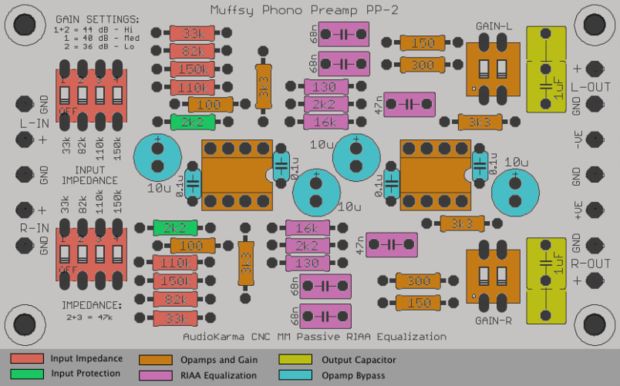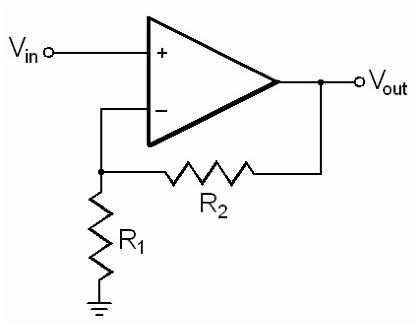...or how to amplify your signal 250 times!
The components colored orange, called "Opamps and Gain" are doing the amplification.

They are absolutely complete standard non-inverting opamp gain stages. The PSU inputs are bypassed (blue components) to both filter the input power and prevent opamp oscillation. These are actually very important, something that can be seen very clearly here.
What about the amplification then? The schematics of the gain stages look like this:

Let's have a look at the first gain stage, the one at the left. These are the resistor values:
- R1: 100 ohm
- R2: 3k3 ohm
The gain for this stage is ~31 dB.
The original CNC circuit uses 3k32 ohm as R2. Replacing it with 3k3 ohm, which is more of a standard component value, makes it easier to find and buy the right resistor.
The second gain stage, the one on the right, is a bit different. R2 is still 3k3 ohm, but R1 is two resistors in parallel that has a 2-way DIP switch to select between them. In this circuit, the two resistors are 150 and 300 ohm. This gives the following values for R1:
- Both switches set to ON: 100 ohm
- Switch 1 set to ON: 150 ohm
- Switch 2 set to ON: 300 ohm
The gains for each of the three settings are:
- 100 ohm: ~31 dB
- 150 ohm: ~27 dB
- 300 ohm: ~23 dB
To get the total amplification of the circuit, add the dB values and you have the total gain. Except... The passive RIAA filter has ~18 dB loss so we have to deduct it from the total. (The RIAA filter will be discussed in another log note)
Long story short, with the variable gain settings we get these (approximately) gains:
- 44 dB
- 40 dB
- 36 dB (this one is a bit closer to 35 dB though, but 36 dB looks nicer ;-) )
In layman's terms, with the highest gain setting, the signal is just about 250 times higher than when it entered the preamp. An average signal of 4.5 mV will be amplified to over 1 V. This puts it in the general CD-player/DAC output area.
With a total gain of about 250x, and considering that the input signal is so weak, a phono preamp needs to be really quiet unless you want to listen at noise at two hundred and fifty times higher than it was to start with. Luckily, the CNC Phono Preamp does a brilliant job in this department. It is dead quiet, when it comes to noise.
After having gone through all that, the phono stage has variable gain. This is actually quite useful, as it can be used to match your turntable signal level with your other input sources. Think of it as a volume control with three fixed presets if you like.
Discussions
Become a Hackaday.io Member
Create an account to leave a comment. Already have an account? Log In.